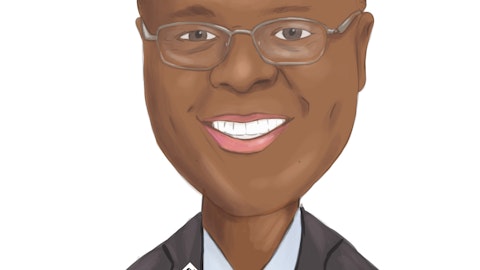Joseph Sutaris: Yes, Chris, we we’ve had — this is Joe. We had a history of kind of low single digits, call it 3% on operating expense increases year-over-year. Obviously the market has changed. There’s been you know, stronger, kind of call it wage-related inflation and other inflationary elements that do make their way into our expense base or operating expense base. So we kind of think that mid-single digits is a more realistic expectation excluding acquisitions on a going-forward basis, just because of those kinds of wage and other sort of inflationary pressures. With that said, Mark alluded to, in his comments, all of the back office type efficiencies that we’re investing in. That will take a while for that to kick in to really get the efficiencies from all of those automation activities in the back office.
So on a more of a kind of shorter term basis, we think, mid-single digits, but our efforts here are to kind of control those operating expenses on a longer term basis through automation and efficiency.
Chris O’Connell: Got it. That’s helpful. And circling back to some of the deposit discussion from earlier. I think if I read your commentary, right, near term expectations, we’re for deposits to remain, somewhat flat versus up. Is that inclusive of the muni flows? Or do you expect kind of ex the municipal deposit fluctuations that there could still be some downward pressure in the near term on the overall deposits.
Dimitar Karaivanov: Chris, this is Dimitar. I think we would expect them the first quarter to be net up on municipal deposits and net down personal deposits, and commercial deposits. Where that ultimately ends up on a net basis is, is a guess. Funding is the biggest question for everybody this year. So we don’t know, we’re planning for certainly lower than historical experience on the deposit side, probably lower than some of our bottom quartile experience, frankly, if you look over 10 years, where we’ve been. So with that in mind, hence the comment that historically, we would have been up in the first quarter and this quarter we’re unlikely to be up as we sit here today.
Chris O’Connell: Great. That’s all I had for now. Thanks for taking my questions.
Dimitar Karaivanov: Thank you, Chris.
Operator: Our next question here will come from Erik Zwick with The Hovde Group. Please go ahead.
Erik Zwick: Hey, good morning, guys.
Joseph Sutaris: Good morning.
Erik Zwick: Just one more topic here on my list that wasn’t discussed in earlier questions or comments, Just looking at the tax rates, my notes are right from last year, about a year ago, you’re expecting a tax rate of kind of 22.5% to 23.5%. It looks like you came in below that this year. So one first question, just curious if you utilize any kind of tax strategies throughout the year that brought it in lower the mix of revenue was just different. And the second part of the question would be, what’s a good expectation for 2023 at this point?
Joseph Sutaris: Yes. Chris, excuse me. Erik, with respect to on a going-forward basis, I still think that, plus or minus a half a point around 22% is probably a reasonable expectation as we as we look ahead. We do occasionally buy tax credits and other items that are helpful for the overall rate, and we do have a municipal securities booked municipal loans that keep the effective tax rate down a bit. So, I wouldn’t expect much change over 2023 or really the future where our current tax rate unless there’s a change in the tax code.





